- Home
- Grace Thompson
Unlocking the Past Page 4
Unlocking the Past Read online
Page 4
“I’m a partner in the firm, remember.”
“Another unbelievable happening!
“And there’s Barry marrying Caroline for real. Now there’s a surprise.” He looked at his sister as he spoke, to gauge her reaction, and saw to his relief that she was smiling. “Are you and Jimmy – you know?”
“No, we’re not. I like him, Viv, but I can’t imagine spending the rest of my life with him. I – I have to start letting him know that.”
“Fresh start, eh?”
When Viv had gone to meet Joan, and the vegetables were prepared for the evening meal, Rhiannon put on a coat and set off for a walk. The weather was cold, with a sneaky wind slanting through the houses and slicing through her clothes to chill her. As she passed the shop on the corner she automatically glanced across to make sure all was well, and from the window of the flat above, she saw the curtains move and a hand wave. Caroline, sitting there all alone. She stopped and gestured, inviting her to walk with her.
The window opened and Caroline thanked her but explained there was so much to do.
“Perhaps next week?” Rhiannon suggested and she walked on towards the docks. Whatever the circumstances of her marriage, Rhiannon sensed the young woman needed a friend.
* * *
Jack Weston’s real surname was Heath, but his grandmother, Gladys Weston, who had produced only twin daughters, had insisted they carried on the family name, intent as she was on founding a dynasty. Jack had let her down twice; first by being unable to achieve greatness in college and career, choosing and enjoying the post of teacher in the local school, then by falling in love with Victoria Jones, daughter of a local drunk, who had worked for her as a servant.
Jack had been saddened by the plight of Victoria’s family when he had called at the home in Goldings Street after her drunken father had drowned. Mrs Jones, expecting her seventh child, was desperately trying to survive on what she earned washing and ironing clothes for other people, plus the little that Victoria earned with his grandmother.
Steve Jones had taken most of his family’s possessions and sold them for money to spend on drink and, with Basil Griffiths helping, Jack had managed to buy back enough to make them comfortable. Now they had a piano, on which Mrs Jones was hoping to give piano lessons, two of Victoria’s brothers were working and things were looking up. Amidst all this he had realised that there was no one in the world who could make him truly happy except the quiet, capable and loving Victoria.
After school closed on that Wednesday, he went straight to number seventeen and swept her into his arms. Today they had decided to make plans for the wedding. To his dismay, Victoria looked fit to burst into tears.
“Victoria? What’s happened?” he asked, glancing at Mrs Jones with a questioning frown.
“Victoria went to see your grandmother this morning, Jack. She sent around a note inviting her to call,” Mrs Jones explained.
“Inviting? Demanding more like.” He looked at Victoria and said, “You should have waited for me, love. You know how she loves to organise people.”
“She’s determined to make me into the kind of wife she considers you need,” Victoria said and she smiled. “I think she’s begun to realise I’m a lost cause.”
“Lost cause? Nonsense, you are the kind of wife I need.” He kissed her cheek then went into the neat kitchen and gathered together decorating materials. He had started work on the tiny back bedroom which was occupied by the three smallest Joneses, determined to completely transform the drab house before he started thinking about the place he and Victoria would call home.
At seven o’clock, after they had eaten, he took out notebook and fountain pen and began making lists.
“First of all a house,” he said. “Where shall we look first?”
They spent the next hour discussing the pros and cons of each road in the town, settling finally for an area around Sophie Street. Gethyn Street that followed Trellis Street and ran behind Sophie Street was a quiet spot that would suit them quite well. It was near the shops and the school, and close to Goldings Street, where Victoria’s family lived.
When it came to the plans for the actual wedding, he sensed apprehension in his bride-to-be. Her face stiffened and there was a slight pulling away from him, and he at once feared the worst. She had had second thoughts, she wanted to call the whole thing off.
Trying to keep his voice calm, he asked, “What is it, Victoria, something worrying you? Tell me and I promise we’ll get it sorted, you and me, we can solve any problem in the world, so long as we’re together.” Aware of her mother not far away he leaned forward and touched his lips against her soft cheek and whispered, “I love you.”
“I love you too,” she whispered back.
“But?”
“I want to be married to you, Jack, but I don’t want to marry you.”
“What on earth does that mean?” he laughed.
“The wedding is beginning to grow into a nightmare. Your mother is sweet about everything, and your cousins, Joan and Megan are trying to be nice, but your Grandmother is ‘training me up to Weston standards’, and insisting on a huge wedding with half of Pendragon Island being invited. I hoped, what with Joan and Viv’s date so near ours, she might concentrate on them and leave us alone,” she said wistfully.
“Leave Joan and Megan to me, and as for Grandmother, I don’t think they have the money for anything grand. Don’t worry, she talks in thousands but it’s thousands they no longer have. We’ll have a happy day with just the family there and a few friends.”
“Just the family! Oh, Jack, if only we could run away and come back married and settle into our life without all this fuss.”
“It’ll be fine, you’ll have a day to remember and I promise you won’t be unhappy for even a moment.”
As he walked to The Railwayman’s to meet Viv Lewis and Basil Griffiths and the others, he was wondering on the best way to make sure that promise was kept. Gladys Weston, his grandmother, was a very determined woman and he was afraid that having no money was not enough to prevent her making his wedding the event of the year.
He would have to get Megan and Joan on his side. If they would help Victoria to choose the clothes for the wedding and help dress the younger members of the Jones clan, he would willingly foot the bill.
But more important than dresses and suits, having Megan and Joan as supporting friends would increase Victoria’s confidence and reduce her fear of being made to look foolish.
He was unaware that he was not the only one to worry. Victoria’s mother was concerned for her daughter marrying into a family for whom she had once worked. The habit of being subservient might refuse to go away. Apologising and constantly saying sorry for the slightest error of etiquette – according to Gladys – could easily get on Jack’s nerves and irritability was a grinding tool that might soon wear holes in their happiness and, eventually, their love.
Without Jack’s unwavering support Victoria would always be at a loss at social functions, although, she admitted to herself, Jack himself seems more at home in the bar of The Railwayman’s with Viv Lewis and the Griffiths boys than in his grandmother’s parlour. Perhaps, she allowed herself to hope, perhaps it would be all right.
She took a cup of tea up to Victoria the following morning, kissed her and said, “Whatever problems you find or create for yourself, dear, remember that Jack loves you for what you are now. What I mean is, don’t try desperately to change. If he wanted someone who’ll grow up into another Gladys Weston, heaven forbid, he would have chosen someone very different from you. He loves you, the real you, very much.”
* * *
The three Griffiths boys were there when Jack reached the pub and, as he walked in, Frank went to the bar and bought him a pint. He sat down next to Viv Lewis and at once started talking about Victoria.
“D’you think you could persuade Joan to give Victoria some time, Viv? I think she’s finding taking on the Westons a bit daunting.”
“I’m no
t surprised, with Gladys in matriarchal control! Why does your mother allow your grandmother to organise your wedding? Shouldn’t it be her talking to Victoria?”
“I know that, my mother knows that, but you try telling my grandmother!”
“Best thing Victoria can do is say yes to everything Gladys suggests, then do what she wants, so quick the old girl can’t change it!”
“Victoria isn’t up to those tricks. She needs a friend to talk to.”
“If she needs help with her frock she’d be better off seeing Megan rather than Joan. She works in Gwennie Woodlas’s gown shop now.”
“It isn’t dress sense she lacks, it’s a friend, Viv. Are you being deliberately obtuse or have you had too much of the brown nectar?”
“Oh, I know what you’re on about, boy. Changing from staff to relation isn’t easy, I know that. God ’elp, don’t I just! I’m marrying one of the Weston Girls, remember. I know what a handful your Grandma Gladys can be. Yes, I’ll have a word with Joan, get her to boost Victoria’s confidence a bit.”
Basil, the only Griffiths who had ever stayed in the same job for more than a month, was a night watchman, having been in regular employment ever since he proposed to Eleri Lewis, the widow of Viv’s older brother, Lewis-boy. Now, as he gathered his foodbag, and stood to leave, he said, “I’ll ask my Eleri to call, shall I? She isn’t one of the God-don’t-I-fancy-myself-Westons, but she knows Victoria and will enjoy a chat now and then.”
“Thanks,” Jack said warmly. “The more friends she has the better.”
Ernie Griffiths was quieter than usual. He and Frank and Viv usually kept up a supply of remarks about the people around them or swapped jokes, but tonight he sipped his beer and seemed, to the observant Basil, to be watching the door. Frank noticed it too.
“Expecting someone gorgeous to walk in, Ernie?” Frank teased.
“Yes, he’ll have to peel his eyeballs off the paintwork if he doesn’t blink soon!” Basil added.
“I’m off girls, they cost too much money,” Ernie muttered.
Basil had only stayed an hour before leaving to begin his night-shift at the factory. As Basil drained his glass, Ernie glanced into the corner where four people were playing darts, then stood up, preparing to follow Basil out.
“Where are we going?” Frank asked, beginning to rise with him. “Hang on, I’ll come with you.”
“No, it’s all right, I just need some fresh air. I’ll meet you back home.” Without giving Frank a chance to follow him, Ernie darted out ahead of Basil and disappeared around the corner. Out of sight, he hared up the road, then, cutting through a lane, turned back on himself and walked sedately across the wasteland that was all to see of Phillips Street, destroyed by two war-time bombs.
He and Frank were such teases, tormenting their friends once they had found a girlfriend, that, having made a date with Helen Gunner, he was trying to keep her existence a secret.
So far they had only met for a brief hour when her parents were in The Railwayman’s Arms. The secret had to be kept from them too, as no self-respecting mother would allow her daughter to be seen with one of the dreadful Griffithses.
As dates go it was unexciting, but to Ernie it was one of the highlights of his life. They walked and stopped at convenient places to kiss primly and shyly, then walked some more. They made another date before he saw her to her door, he stole a final and very brief kiss and ran home as if his heart was on fire.
* * *
Janet Griffiths was worried about Caroline. She had a strong feeling that all was not well with the marriage. She saw her daughter every day and on most days Barry came too, either to bring Joseph to her while Caroline worked, or to collect him to take him back to the flat in Sophie Street.
One Wednesday lunchtime when Caroline came to take her son home, she persuaded her to stay and eat lunch with them. Leaving Hywel and the boys to eat theirs in the living room, she took two steaming plates of rabbit stew into the kitchen.
“There’s something I want to tell you,” Janet began. “I wrote to that Mrs Phillips who told me when my father died, and asked her if she could give me any ideas on where to look for my sister.” She took a letter out of her apron pocket and handed it to Caroline. “That’s her reply. The address is a place where Marion once worked. They might know something. Will you come with me, love? It isn’t far. We could go this afternoon.”
Once the arrangements had been made and they had set off in the old van with which Hywel and the boys made what money they needed, Janet glanced at her subdued daughter and said,
“I’ve confided in you, love. Isn’t it time you confided in me?” To her alarm, Caroline burst into tears.
Janet stopped the van in the gateway of a field and hugged her, talking soothingly, patting her shoulder as if she were a child.
“I’ve made the most awful mistake, Mam. Barry doesn’t love me. He still wishes he was married to Rhiannon.”
“What a lot of nonsense. I only had to look at his face to see how he cared for you. Plain as plain it was, even before he realised it himself.”
“We go through each day in our separate lives, share the same small rooms but I might as well have stayed with you and Dad.”
“You mean you haven’t—?”
“He’s done it all for Joseph. He doesn’t love me at all.”
“And you?” Janet asked softly, “Do you love him or are you still in love with the other Joseph, the baby’s father?”
“I’ll always love Joseph Martin. I don’t think that will ever change. Barry is different but I really felt a love for him, Mam. But sharing a home, just the two of us, it seemed to bring everything back. I keep imagining living there with Joseph, waiting for Joseph to come in and eat the food I’ve prepared. It was where Joseph and I were going to live, remember.”
“D’you know, foolish old woman that I am, I hadn’t remembered. What a stupid woman I am not to have realised it was a mistake.”
“The whole thing was a mistake. Marrying Barry so the baby would have his father’s name was a mistake and everything we’ve done since has made it worse.”
“You have to talk to Barry, make him understand that the flat is filled with ghosts. You can’t be a wife to him in the very place, the very room, where you had planned to live with his brother. He’ll understand and see that you have to get out and find a place of your own. His mother will too, I’m sure. Come on love, all it takes is honest talk and that’s not so hard is it?”
Honesty is relative, Caroline thought sadly. She wasn’t honest enough to tell her mother that the room where she slept with Barry was the room in which her child, Barry’s brother Joseph’s child, had been conceived. How could she tell Barry that?
Hugging her daughter again and surreptitiously drying her own tears, Janet said,
“We’ll leave the visit for today. We can go next week, things will be better when you’re more cheerful. You’ll have talked to Barry by then and sorted everything out, won’t you, love? It’ll be that easy once you start you’ll wonder why you didn’t do it before.”
Chapter Three
Hywel Griffiths was arrested at the end of March. It was an amicable affair, with Farmer Booker and the local constable escorting him to the police station to charge him, and at the same time discussing the best way to cook pheasant.
An appearance at court and a fine was hardly surprising and was not worth more than a brief few lines in the local paper alongside those habitual drunks that received a regular mention. For Hywel it was a turning point. He had no intention of giving up taking the occasional pheasant or rabbit for the pot, but the fines made it an expensive food and Farmer Booker was becoming more sophisticated and more determined in his campaign to stop poachers making a living from his land.
“Janet? Are you there?” he called when he went into the cottage, looking far from his usual happy self. A scowl creased his face and his dark eyes glowered with something akin to fury. He was not pleased with the day’s happenings so
far. His rare lack of humour was due in part to his uncomfortable attire.
A court appearance necessitated looking respectable, and today Hywel had abandoned his misshapen denim trousers, which even after suffering the indignity of being scrubbed and hung out to dry still carried the imprint of his legs, and had dressed “tidy”. He wore a pair of pin-striped trousers, a long overcoat that had belonged to his father, and a trilby hat, that had seen better days, which he wore tilted rakishly across one eye. He didn’t possess any shoes but his boots had been scrubbed clean of mud and polished in the army manner with spit and polish and a lot of elbow grease until the toe caps shone like a calm sea in sunlight.
He was not a tall man like his sons, but he was strongly built and now, with shoulders squeezed into the coat and threatening to pop the seams in protest at the restraint, he looked dangerous.
“Hywel? What on earth has happened?” Janet asked as she hurried forward to relieve him of his coat, tugging to free it from the wide and well-padded shoulders of her irate husband. “Come on, I’ll get you a drink of cider, calm you down.”
“I don’t want to calm down. I want to stay angry,” he said, kicking off the heavy boots and feeling under the table with his feet for his slippers. “D’you know, them rabbits, them measly rabbits, cost me more than if I’d bought them legal, in the shop? Miserable sod, old Booker. I think he’s in cohorts with that damned magistrate. That fine is the last I’m paying.”
“What will you do?” she asked as she handed him a glass of foaming cider from the barrel in the kitchen. “Don’t tell me, you’re going to find a job!”
“Yes I am. And as well as chickens I’m going to keep geese, ducks and goats.”
“How will that prevent fines?”
“Every time I’m up there accused of stealing a wild rabbit from old Booker, the magistrate points out that I must be guilty as I have no other means of support. He natters on about not paying taxes and being a drain on the purses of decent people and slaps the biggest fine he can on me. I’m going to show that I’m gainfully employed and with eggs and milk, cheese and meat to sell, I might even pay tax! I’ll prove that I’ve no need to pinch his miserable rabbits and pheasants. I’ll plead not guilty.” His face lit up and he added, “Perhaps I’ll be able to summon Booker for defamation of character!”

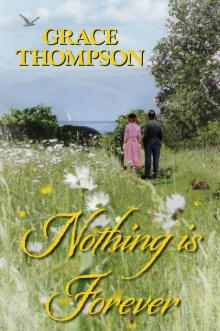 Nothing is Forever
Nothing is Forever Friends and Secrets
Friends and Secrets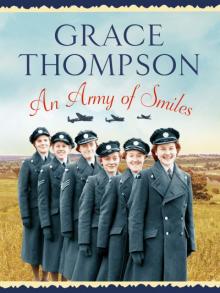 An Army of Smiles
An Army of Smiles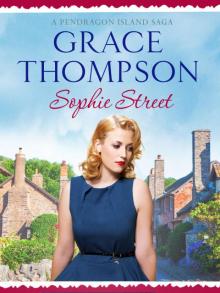 Sophie Street
Sophie Street Gull Island
Gull Island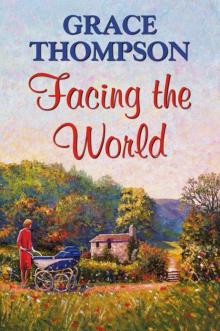 Facing the World
Facing the World The End of a Journey
The End of a Journey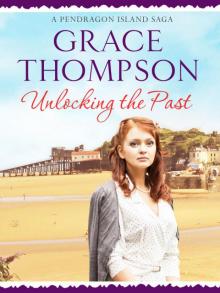 Unlocking the Past
Unlocking the Past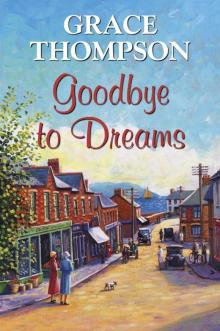 Goodbye to Dreams
Goodbye to Dreams The Weston Girls
The Weston Girls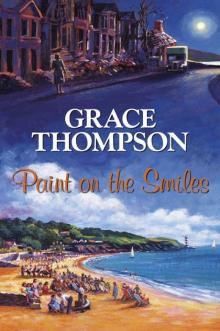 Paint on the Smiles
Paint on the Smiles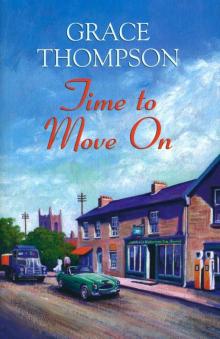 Time to Move On
Time to Move On The Runaway
The Runaway